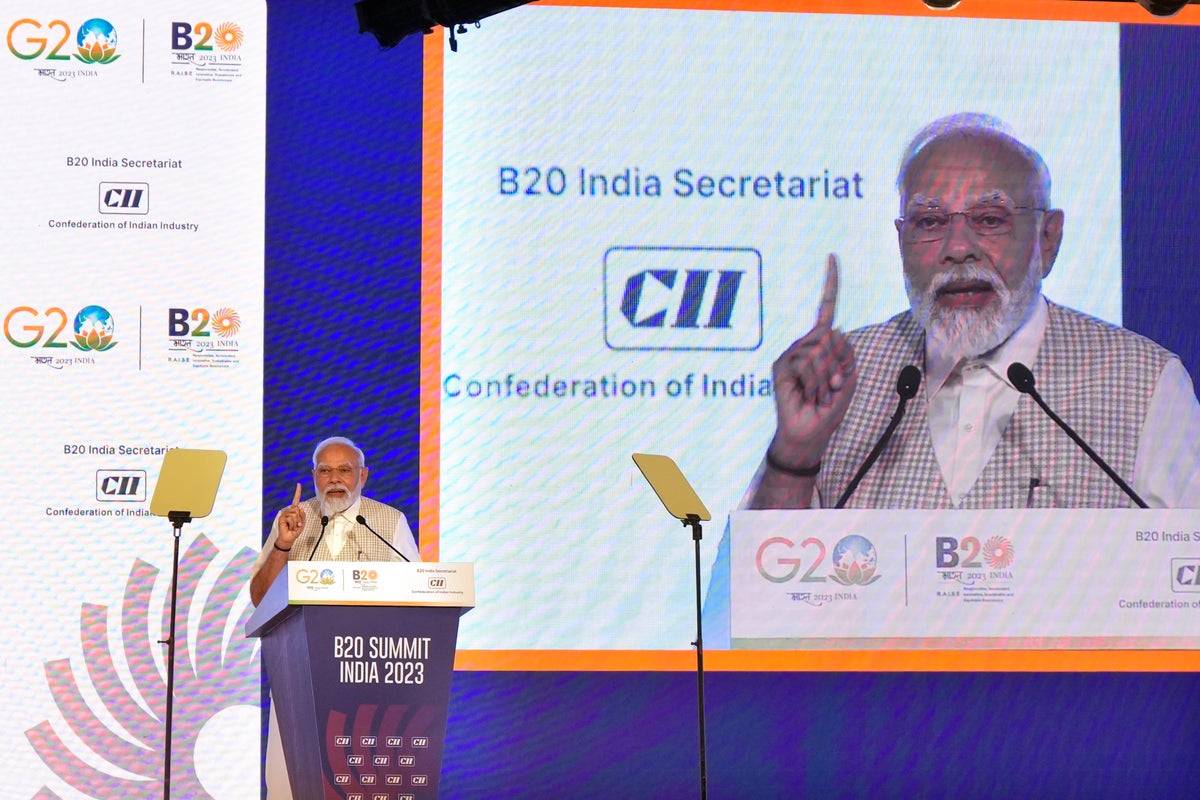
Indian Prime Minister Narendra Modi said the country’s role as the G20 host this year would focus on highlighting the concerns of the developing world, and has proposed the African Union to become permanent members of the forum.
“We have a vision of inclusiveness and with that vision, we have invited the African Union to become permanent members of the G20,” Modi said on Sunday as he addressed the Business 20 Summit in New Delhi.
The B20 is an industry event and part of the summit of the 20 leading rich and developing nations, which will be hosted in the Indian capital next month.
Over three days, industry and policy leaders from around the world have discussed themes like building resilient supply chains, digital transformation, debt distress facing developing countries and how to advance on climate change goals. Their recommendations will be shared with the G20 governments, organizers said.
As host of the G20 this year, India has struggled to bridge the differences among member countries over the war in Ukraine. None of the several meetings held in the country has succeeded in producing a communique, sparking questions over whether the leaders meeting next month will break the deadlock.
Instead, India has consistently appealed for the fractured grouping to reach consensus on issues that disproportionately affect developing countries, or the so-called Global South. They include unsustainable debt levels, inflation and the threat of climate change, even if the broader East-West split over Ukraine can’t be resolved.
A key part of that strategy is bringing the African Union into the G20 fold, analysts say.
“When India assumed the G20 presidency last December, we were acutely conscious that most of the Global South would not be at the table when we meet," said External Affairs Minister Subrahmanyam Jaishankar. "This mattered very much because the really urgent problems are those faced by them. ... And India, itself so much a part of the Global South, could not stand by and let that happen.”
He said the G20 has so far deliberated on rising debt, sustainable development, climate action and food security, among other issues that affect low to middle-income countries. “The core mandate of the G20 is to promote economic growth and development. This cannot advance if the crucial concerns of the Global South are not addressed,” Jaishankar added.
The three-day conference in New Delhi was also attended by ministers and policymakers from other G20 countries, including the United Kingdom and India's regional rival, China.
On Friday, China's Vice Commerce Minister Wang Shouwen said trade between the two neighboring countries, whose relations have been strained after deadly border clashes in 2020, was growing fast. He added that India was welcome to join the Regional Comprehensive Economic Partnership, a China-centered Asian trade bloc that was formed last year.
Piyush Goyal, India's minister of commerce and industry, said that joining the bloc would have increased trade between the two Asian giants, but it would have also increased the trade deficit.
“We just can’t seem to understand the kind of pricing, the kind of cost at which you are supplying goods. It’s a matter that I think all the ministers would like to know. How you can supply goods at less than the raw material costs?”
India's trade deficit with China is the highest of any country, and stood at $101.28 billion in 2022, according to official data.







